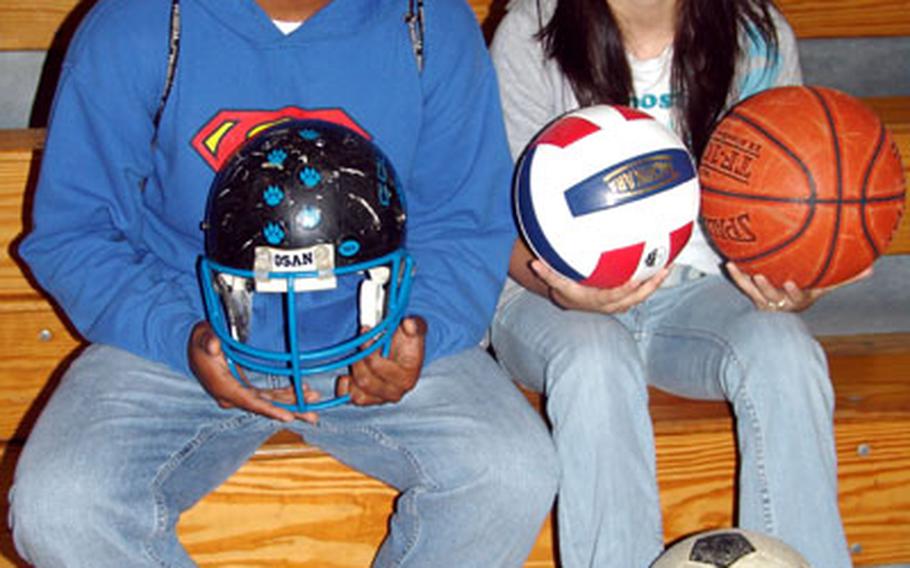
Osan American Cougars junior running back Will Rapoza and senior volleyball, basketball and soccer player Dawn Moore would love to be anywhere but on the sideline playing for their teams. But torn ACLs in their left knees got in the way. (Brian Swenty / Special to Stripes)
Osan American junior Will Rapoza and senior Dawn Moore were key cogs in the Cougars’ drive for Class A championship hardware: Rapoza in football, Moore in — oh, take your pick — volleyball, basketball and soccer.
Then, by coincidence or cruel fate, torn anterior cruciate ligaments in each of their left knees undid those championship plans.
And even long months after their respective surgeries, they struggle through rehabilitation weightlifting and exercise. They must be careful how and where they do the simple act of walking, lest more misfortune befall them.
Worst of all, as they sit on the sidelines, is knowing how they could help their respective teams – if only health would permit it.
“You’re wanting to play, but you’re wanting to take care of yourself first,” said Rapoza, who got hurt last Oct. 25 in a 34-20 loss at Seoul American.
It was on a “hook-and-lateral” play. Rapoza caught a pass and wheeled to pitch the ball to Carlos Albaladejo. His cleats stuck in the ground, the stress transferred to his left knee, shredding the ACL.
“I heard a pop. I didn’t know what it was. My left leg stayed put, it knocked the breath out of me and hurt really badly,” said Rapoza.
He had a teammate fall on the knee three plays earlier, but Rapoza stayed in the game.
“I wish I never would have come back to the field, just stayed out the rest of that game,” he said.
Rapoza took his 576 yards on 56 carries to the sideline, and Osan went on to lose the Class A championship game 23-0 at Edgren.
Joining him in the bleachers four months later was Moore, an unlikely 5-foot-2 volleyball middle blocker who had 80 spike kills and 20 blocks during the 2006 season. Osan went 12-12 and placed fourth in the Class A tournament.
“I’m just dying to be out there (but) I definitely don’t want to reinjure it or anything,” said Moore, whose injury occurred during the Far East basketball tournament last Feb. 21. She had been averaging six assists and four steals per game until the injury.
It was the third quarter of a playoff game against Matthew C. Perry of Japan. She tried to steal the ball, but it went out of bounds, Moore leaped after it, fell down and felt a pain in the knee.
“I was shocked, confused. I didn’t know what was going on,” she said, adding that she was able to walk about five minutes later and went back into the contest, but “once I tried to play defense, it went out on me again. I wanted to play, but I knew I couldn’t. I was so angry.”
The words “torn ACL” are generally a death knell for an athlete’s season and sometimes entire careers. ACL tears require surgery and months, sometimes years, of rigorous rehabilitation.
That means long, painful hours in the fitness center on treadmills and weight machines. But even more painful is the knowledge that while the desire is there, the knee keeps saying no.
“Mixed feelings,” Rapoza said. “Not getting to play sports, having to go back and forth to the hospital, making sure the knee is OK, hoping to not tear it again.”
“Just being able to go places without having to worry about taking care of my knee,” Moore said. “Every time I walk, I look down to make sure there’s no dip in the road. Just not to be able to do normal things.”
While the two agonize over being sidelined, teammates and coaches miss them as well.
“It hurts,” Moore’s senior teammate Sasha Gluzinski said. “She did an amazing job at middle blocker with her height. We missed her on defense in soccer. And she’s a real team leader in all sports.”
The one silver lining for Rapoza is he’ll be able to play his senior year. But that doesn’t help Moore, and makes her teammates feel even worse for her.
“We feel so badly, so much, because she can’t be out there,” junior Laura Vega said.
Volleyball coach Brian Swenty says it’s “impossible” to replace Moore.
“She brought so much energy to our practices and matches; it was evident that she simply loved movement,” Swenty said. “She never quit, ever. I could always count on her in the clutch. Although the team is doing well, she is sorely missed.”
But coaches also must walk a “tough line,” Rapoza’s coach Tony Alvardo said, wanting the stars to play but ensuring their good health first.
“Ultimately, we know he can make us better, but you have to consider his life, not just football,” Alvarado said. “You do what’s right for the athlete. It’s not just about winning.”
That’s the message Moore and Rapoza want other athletes facing the same situation to understand.
“Make sure you fix it before you go out there and hurt it more, because then it will be harder for you,” Moore said. “I would rather wait than hurt it worse and wait a lot longer.”